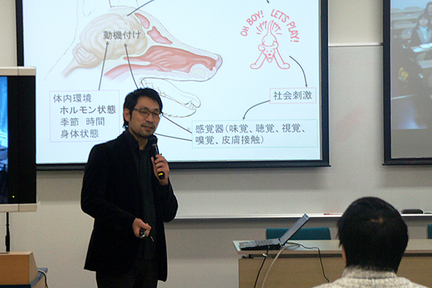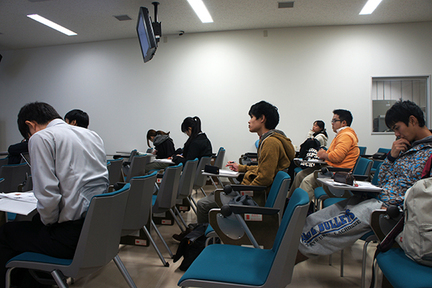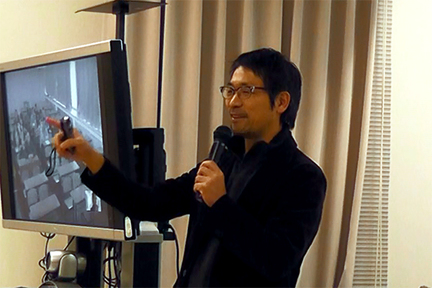I Want to Learn How to Think Beyond Academic Disciplines
Vol.6 2014.11.19 Takefumi KIKUSUI
Communication through Excreta
Animals including human beings ingest nutrition by mouth and excrete the disused products. Generally speaking, there is an image that excreta is redundant but in fact the communications generated through the use of excreta is important in the world of animals. For example, hippopotamuses claim the right to their territory by their excreta and dogs mark their territories by lifting their legs high. It is said that this excreta contains the information of gender, age, status, provisions, blood relations, individuals and the state of infection. This information is important for the purpose of building or keeping relations between individuals. The majority of excreta is accepted as scent by animals and it changes their behaviour and internal secretions. There are animals such as rabbits and koalas which eat excreta. They spread the intestinal flora and have a peculiar metabolism by eating excreta. Excreta provides a treasure of information and the information it provides, goes beyond our expectations.
In this lecture, I am going to introduce such communication through excreta in the world of animals.
- Instructor
-

- Takefumi KIKUSUI
- Professor at the Department of Veterinary Medicine, University of Azabu (Doctor of Veterinary Medicine) He graduated from the College of Veterinary Medicine, the Faculty of Agriculture, the University of Tokyo. After having worked for the graduate school of agricultural and life sciences as an assistant, he became an associate professor at the the Department of Veterinary Medicine, University of Azabu in 2007. He has been in his present post since 2009. He loves dogs and goes to work with his pet dog (standard poodle). At the weekend, he walks with his dog. His literary works include: Ikimono no sanpo michi (The path for a walk for the animals) (buneido, 2011), Inu no kokoro o yomu: Hanryo dobutsugaku kara wakaru koto (Reading of the mind of the dogs: Learning from the study of the companion animals) (Iwanami kagaku library, 2012), Kansatsu suru me ga kawaru dobutsugaku nyumon (A guide to zoology which changes an observant eye) (Bere shuppan, 2014).
- Resume Download
comments(最新2件 / 9)
- 2014年11月20日 15:05 reply
コアラが母の便を食べるということに驚いた。その理由は赤ん坊が葉を消化できないから、とのこと。
- 2014年11月20日 18:13 reply
糞食に最も衝撃を受けましたが、現代人が通常価値のないものとみなす糞には、予想以上に重要で多様な用途があることを知りました。特にウサギの例は意外でした。
また一夫多妻や一夫一妻をめぐる議論にも生物学的な要因が絡んでいたことには驚きでした。やはり人間はいかなる面でも生物学的な側面からは逃れられないように感じました。
- 2014年11月25日 12:37 reply
牛などが食事の時に、反芻を行っていることは知っていましたが、まさか一度排泄したものをまた食べる動物もいることには驚きでした。けれどたしか、ある特定の木の実を食べるリスの糞からとれる木の実は美味しいという話をどこかで聞いた覚えがあったので、糞食も案外普通のことなのかもしれないと思いました。
- 2014年11月25日 18:14 reply
涙の中のフェロモン物質や、糞尿を使ったコミュニケーションなど、この講義でしか聞くことができないものが多くて面白かった。特に父と子の関係の話は、母と子の話に比べて聞く機会が今まで余りなかったので興味深かった。
- 2014年11月25日 22:03 reply
排泄と言っても広義に捉えられ、様々な動物の排泄がかくも様々に機能を持つのかということは驚きでした。もっとも糞尿だけを特別視するのは相対化して考えれば人間だけなのでしょうが。特に、ネズミの性行動に涙が影響する事例などが非常に印象的でした。大変おもしろい講義でした!
- 2014年11月25日 22:18 reply
排泄物は、本来的には身体にとって不要であるとして体外に放出されたいわば無益なものであったにもかかわらず、実際には多くの情報を内包した価値ある物質として機能している、という視点が印象的であった。一方で、例えば植物の場合に花の香りが受粉を媒介する虫たちを呼び寄せる働きを担っているということを考えると、人間(あるいは動物)から発せられる臭いが花の香りのように有益な情報を内包していてもおかしくないというようにも感じた。実際に調べてみると、植物のなんの変哲も無いように見える植物の緑の葉っぱもまた、葉を青虫などに食べられないように臭い(香り)を発しているのだということがわかった。体外に放出される以上、何らかの価値を持つように人間(動物)は進化したのではないかと考えさせられた。
- 2014年11月25日 22:46 reply
人間以外の殆どの動物が自らの領域を糞尿によって、線引きをしているが、人間だけは極度に糞尿を忌み嫌い(この点自体もかなり特殊に思えるが)、意識的かつ恣意的に境界を設けている。現在人間社会ではボーダレス社会化が進んでいると言われているが、人間を動物集合の要素と捉えればボーダレス化は可能でないように思えるが、人間の特殊性を考えれば不可能でないように思える。
- 2014年11月25日 23:27 reply
アリが自分のコロニーと他のコロニーの差を臭いで判別する事が興味深かったです。アリは、同一種間で組織的に戦う、動物界では珍しい種族であるという話を聞いた事があります。そういった事にも臭いや排泄が極めて強く関係しているという事が、この分野の重要性を示しているように感じます。
Post a Comment
- Other Lessons



人には、糞尿以外で線引きをする方法が数多くあったために糞尿を使う必要はなかったが、動物は、手軽に体から切り離して自分の存在を知らしめろ方法が糞尿のほかになかったために多くの動物が糞尿を使っているのだろうと感じた。
また、これからボーダーレスの社会の構築を世界が進んでいくことになるが、先生もおっしゃっていたように、動物としてのヒトはやはり完全なボーダーレスでは生きられないであろうと思う。ボーダーはボーダーとしてしっかり決めて、それぞれのテリトリーを保障した上で、ボーダー間の交流をより活発にしていくようにしないと、好き勝手にヒトが入り混じる文字通りのボーダーレスの状況は作りえないと思った。